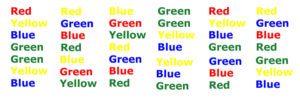Quick Hits
Daily brief research updates from the cognitive sciences

Last year I reported on how pollution and bad air in offices correlates with lower performance and productivity. Something business should take note of.
A study out of the University of Tsukuba has looked into decision-making under physical fatigue. Now this may seem to be off on a tangent and not related to the business world but they were specifically trying to look at what specifically clouds judgement under fatigue.
We know that when under fatigue, during or after strenuous activity, that so-called executive function decreases. Executive function is the ability to control impulses and control cognitive processes. One test of this is the Stroop test. The Stroop test flashes coloured words such as “red” but the text is either in the same colour or a different colour (e.g. red or red). If the text matches the text colour you click yes. If it doesn’t you click no.

This is tricky at the best of times and is often used as an executive function test in its own right.
When doing strenuous exercise, performance on this drops, often dramatically. The question now is, is it, because of attentional issues, a change in brain function to be able to exert yourself, or reduced oxygen?
The researchers devised an experiment whereby they were able to manipulate oxygen supply to the brain and thereby see whether it was just the oxygen levels that influenced this. And yes, when oxygen supply remained stable during exercise, performance on the Stroop test was influenced much less.
So, this shows that it is the oxygen supply that clouds judgment – or ability to deliver oxygen to critical executive regions of the brain.
That is important because that shows that oxygen supply to the brain is important for all decision-making in all conditions.
Take note businesses particularly those with those muggy meeting rooms where executives make critical decisions●

Andy Habermacher
Andy is author of leading brains Review, Neuroleadership, and multiple other books. He has been intensively involved in writing and research into neuroleadership and is considered one of Europe’s leading experts. He is also a well-known public speaker speaking on the brain and human behaviour.
Andy is also a masters athlete (middle distance running) and competes regularly at international competitions (and holds a few national records in his age category).
Reference
Genta Ochi, Ryuta Kuwamizu, Kazuya Suwabe, Takemune Fukuie, Kazuki Hyodo, Hideaki Soya.
Cognitive fatigue due to exercise under normobaric hypoxia is related to hypoxemia during exercise.
Scientific Reports, 2022; 12 (1)
DOI: 10.1038/s41598-022-14146-5
More Quick Hits
Behaviour at eight helps predict midlife health behaviours
A long-term study in Finland has tracked children from the age of eight until the age of 50 and a new analysis of the data, just published, has looked at some of the correlations between socioemotional behaviour in childhood and later life achievement and health...
Psychedelics and consciousness
Psychedelics change our conscious experience of the world – that is part of their attraction. Now a new study out of John Hopkins Medicine has analysed data on attributions of consciousness to other animals and innate objects by those using psychedelics and how this...
Lower smartphone usage increases wellbeing
So much has been said about smartphone usage in modern times. This ranges from some who say that they are destroying our brain to others who see they benefit our cognition by outsourcing cognitive heavy tasks like remembering lists of phone numbers – thereby freeing...
Modesty preferred for cooperative teams
In an age where it appears that many people are vying for self-esteem especially through social media, this research is interesting. Particularly in business contexts where cooperation is king. Research has previously shown that appearing to be wealthy increases...
Poverty shrinks babies’ brains
Quick HitsDaily brief research updates from the cognitive sciences couple of studies have just been released which look at the brains of newborns and young babies. The results are worrying for any society. Brain scans of newborn babies from...
Babies born with five from seven functional brain networks
In the 1950s the blank slate theory was the most prominent theory ascribed to babies. They are born blank slates and then their experiences allow them to develop their networks thoughts, associations, etc., and just about everything else. Though this theory is long...






